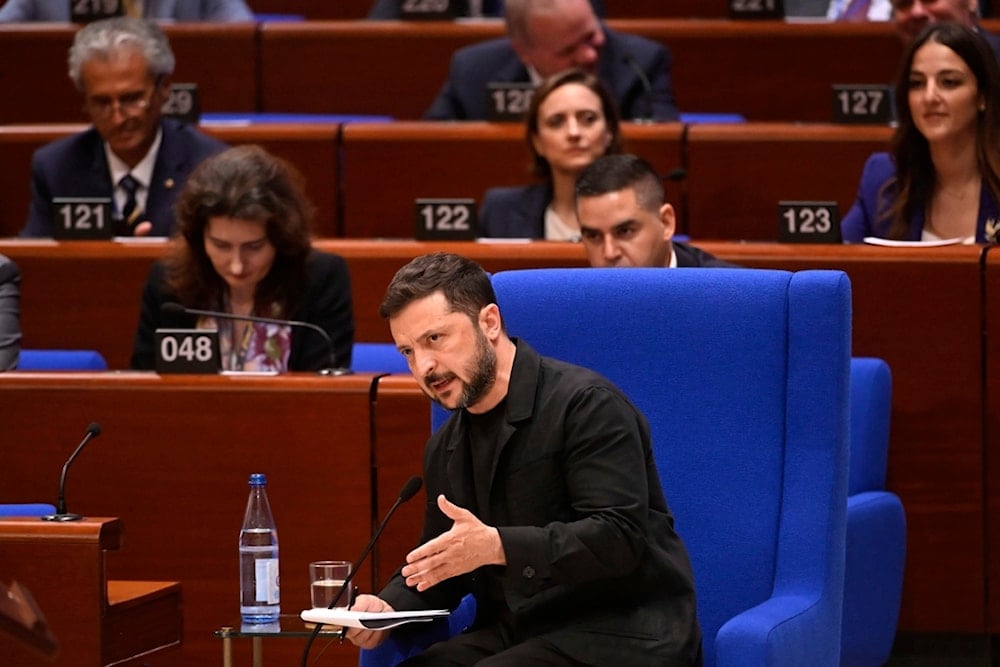Zelensky presses EU to tighten oil price cap as sanctions talks stall
Ukrainian President Zelensky urged the EU to lower its Russian oil price cap, criticizing some member states’ ongoing energy dependence on Moscow, as divisions within the bloc stall new sanctions and Moscow adapts through alternative exports and shadow fleets.
-

Ukraine's President Volodymyr Zelensky delivers a speech at the Council of Europe after signing the legal instruments necessary to launch the Special Tribunal for the Crime of Aggression against Ukraine, in Strasbourg, eastern France, Wednesday, June 25, 2025. (AP Photo/Pascal Bastien)
Ukrainian President Volodymyr Zelensky has called on the European Union to sharply lower its price cap on Russian oil, voicing frustration over the enduring dependence of certain EU member states on energy imports from Moscow. His comments come amid ongoing negotiations over the bloc's 18th sanctions package against Russia.
Speaking before the European Council on Thursday, Zelensky stated, "Over time, we have seen how strong some European countries still depend on Russian oil, and we really understand this and we act carefully, as our partnership with the EU requires. Yet, sadly, we don't always feel the same understanding in return when it comes to Ukraine's needs. It feels especially strange to hear such strong criticism, even political pressure from some leaders, while our respect of EU rules allows oil to keep flowing."
He urged the EU to act decisively by reducing the oil price cap to $30 per barrel, or at least $45, a move Kiev believes could significantly diminish Russian revenue streams that fund the war effort.
Addressing the European Council, I stated: the world is clearly unstable. But the EU plays a key role in preventing Russia’s war from spreading and in moving toward peace. Its sanctions against Russia remain one of the most effective tools for limiting the aggression. pic.twitter.com/OYMLBz99Tc
— Volodymyr Zelenskyy / Володимир Зеленський (@ZelenskyyUa) June 26, 2025
Zelensky's remarks were aimed not just at Brussels, but also at specific EU countries, such as Slovakia and Hungary, that have resisted deeper energy sanctions. Slovak Prime Minister Robert Fico confirmed his country would not support the new sanctions proposal scheduled for a vote on Friday, arguing that it would be premature to move forward without addressing the consequences of cutting off Russian energy. "Slovakia demands that the vote be postponed until solutions are found," Fico said earlier this week.
Energy divide
The debate underscores widening divisions within the EU over energy strategy. While countries like Poland and the Baltic states support more aggressive measures, others fear the economic consequences of a complete decoupling from Russian energy. Hungary and Slovakia, for example, still rely on Russian crude for over 80% of their oil imports, facilitated through pipeline contracts that remain exempt from current EU embargoes.
The European Commission has sought to address this imbalance through its REPowerEU strategy, introduced in 2022. A roadmap published in May 2025 outlines plans to ban Russian energy imports under new and spot contracts by the end of this year and fully eliminate Russian fossil fuel imports, including long-term pipeline and LNG contracts, by the close of 2027.
Yet despite EU efforts to tighten sanctions, Russia has shown resilience. It has rerouted oil exports to Asia, particularly China, India, and Turkey, and operates a vast "shadow fleet" of over 1,100 tankers to circumvent Western tracking and insurance mechanisms. These tactics have helped Moscow keep its oil revenues flowing despite price caps and embargoes.
In fact, while EU reliance on Russian oil has dropped to just 3% overall, pipeline deliveries to Slovakia and Hungary remain largely intact. And though EU gas imports from Russia fell from 45% in 2021 to 19% in 2023, they rebounded by 18% in 2024, according to the energy think tank Ember.
Russia has denounced EU proposals to further lower the price cap. Kremlin spokesperson Dmitry Peskov warned such measures would destabilize global energy markets, and officials in Moscow have threatened to reduce oil supplies further if stricter caps are implemented.
Read more: Russia crude oil exports surge to five-month high

 3 Min Read
3 Min Read









